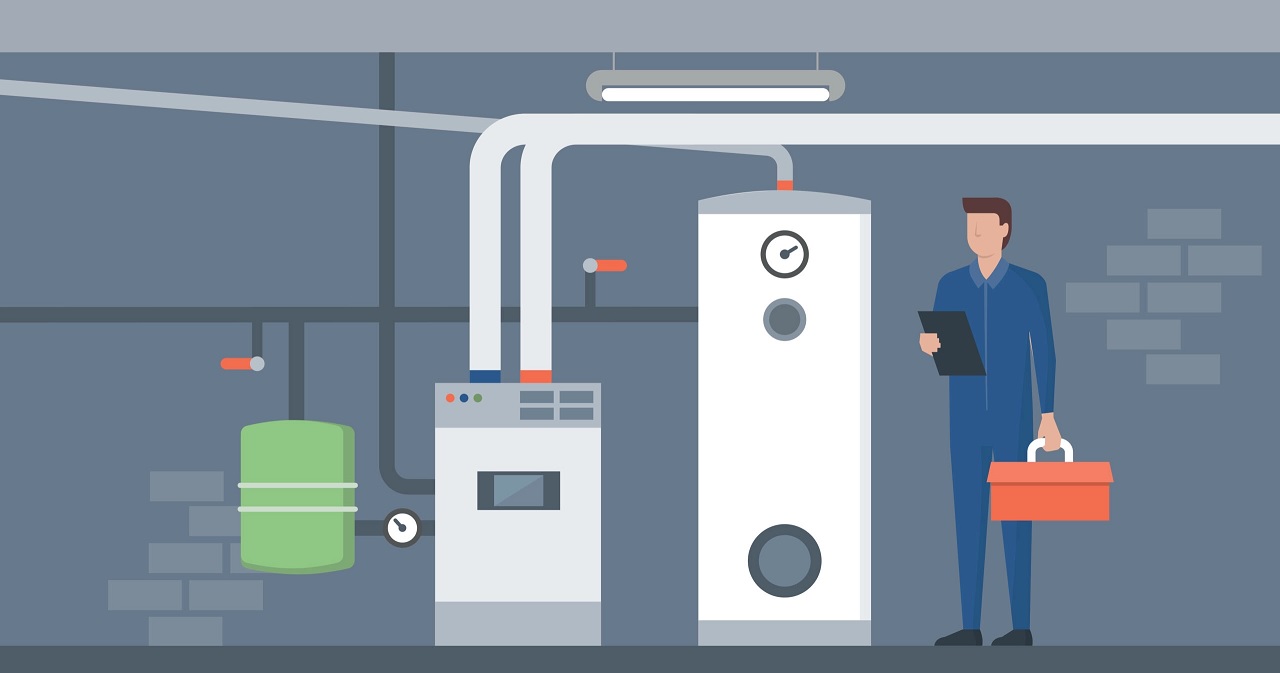If you are thinking about buying new heating systems for homes or offices, you should ask yourself, among other things, whether you want to buy or rent a new heating system.
Up to 30 percent of energy costs can be saved by purchasing new heating systems for homes or offices. New heaters already work with condensing technology and use the fuel optimally. In contrast to older heaters with condensing technology, with the newer condensing technology the heat from the exhaust gases is added to the heating circuit instead of escaping through the chimney.
In many boiler rooms, there are completely outdated boilers. The installation of newer models results in an enormous energy-saving potential. The older the existing heating system is, the greater the savings potential that can be exploited when modernizing the heating system.

Buying a new, state-of-the-art heater can be expensive. Although many consumers are aware of the enormous savings potential, the high costs of purchasing a new heating system make many consumers shy away from it.
But there is a convenient solution: Rent your heating! Then you are always up to date with the latest technology.
Advantages and disadvantages of buying or renting new heating systems for homes or units
Buying heating systems for homes or offices can be a big investment. The question often arises as to whether the system should be bought or rented. Both options have their pros and cons that should be carefully considered. Below we’ll take a closer look at the pros and cons of buying and renting a heating system to help you with your decision.
Advantages when buying a heating system
Long-term cost savings
Although buying new heating systems for homes or offices initially requires a larger financial investment, it can prove to be more cost-effective in the long run as there are no monthly rental costs and running costs are often lower.
In the long term, buying a heating system is usually cheaper than renting it because you don’t have to make any further payments once the financing has been completed.
Ownership
When purchasing heating systems for homes or offices, it belongs to the buyer, which gives them greater freedom, such as choosing a specific manufacturer or deciding on upgrades and repairs.
As the owner, you have full control over the heating system and can decide for yourself which maintenance and repair work should be carried out.
Promotions
You can adapt the heating system to your own needs and, for example, choose a particularly energy-efficient variant. There are often government subsidies for heating and tax benefits when you buy an energy-efficient heating system.
Benefits of moving
Purchased heating systems for homes or offices can simply be taken with you when you move, without having to worry about returning or selling the system. In practice, however, this is not always relevant, since most installations do not fit into the new apartment or house.
A financial assignment to the subsequent tenants or the buyer of the property may be an alternative solution here.
A real investment
After purchase, the heating system belongs to the owner and can be considered an asset.
Read Also: 5 Tips For Smarter Online Shopping
Disadvantages of buying a heating system
High acquisition costs
Buying a new heating system often requires a major investment and can therefore be difficult for some households.
Repair and maintenance costs
Since the heating system belongs to the buyer, he is also responsible for the repair and maintenance costs, which may incur additional costs.
Technology changes
Since the technology in the field of heating systems is changing rapidly, there is a possibility that in a few years, the purchased system will become obsolete and will need to be replaced.
Advantages of renting a heating system
Lower initial costs
When renting a heating system, the initial costs are often lower than when buying it and you can cover the costs in the form of a monthly rental payment. Renting a heating system can be a sensible option for landlords of apartments or buildings since they do not have high acquisition costs at once and these can be passed on to the rental payments.
Maintenance and repairs included
Renting a heating system is particularly interesting for tenants of apartments or buildings, as they are usually not responsible for the purchase and maintenance of the heating system. The landlord usually bears the risk of repair costs and system failures.
Smooth replacement of the heating system
A rented heating system can easily be exchanged for a new one if required, without having to worry about selling the old system.
Disadvantages of renting a heating system
More expensive than buying in the long run
In the long run, renting a heating system is usually more expensive than buying it, as you have higher overall costs over the rental period.
Little control over the heating system
As a tenant, you usually have less control over the heating system and have to adhere to the specifications of the landlord.
No customization possible
As a rule, the heating system cannot be individually adapted to one’s own needs.
How much does it cost to rent a heater?
As a rule, a homeowner has to calculate several thousand euros for the purchase of a new heating system. Investing in replacing the heating system is always worthwhile because outdated systems waste an enormous amount of energy and therefore money.
The exact rental price for a heating system depends on the heating system selected and the provider. Economical and modern heaters are available for as little as 79 euros a month. So you no longer have to dig deep into your pocket to be up to date with the latest technology!
The length of the rental agreement can also have an impact on the costs. It is therefore advisable to obtain information from various providers and obtain offers in order to find the best conditions.
What is meant by contracting a heating system or heat contracting?
Heating contracting means renting a heating system. This process can be compared to leasing a vehicle.
First, the heating is planned and designed based on the structural properties and the needs of the customer. The contractual partner takes care of the removal, the professional disposal of the old heating system, and the installation and maintenance of the new system.
In addition to the new heating system, all important full services are also supplied. This includes, for example, checks as well as maintenance and repair work.
The contractual partner guarantees the customer trouble-free operation of the heating system. The customer has to pay a monthly fee for this and can thus avoid the high investment costs of buying a heating system.
If you want to rent a heater today, you can contact your energy supplier. However, many planners and heating companies also offer contracting models. The contract period is usually 10 to 15 years.
With heating contracting, there are various options at the end or after the end of the contract period, depending on the agreement in the contract.
Extension of the contract
It is possible to extend the contract with the heating contractor? This can make sense if you are satisfied with the service and the conditions of the provider and still need a rented heating system.
Purchase of the heating system
It is often possible to purchase the heating system at the end of the contract at a previously agreed price. If you are happy with the investment and want to use it for the long term, this may be a good option for you.
Return of the heating system
If you no longer need the rented heating system or would like to switch to a different type of heating, you can return the system to the heating contractor. However, you should note whether and what costs are incurred for this.
You can also have the heating removed and conclude a contract for a new heat generator.
Switch to another provider
If you no longer want to work with the current heating contractor, you can opt for another provider after the end of the contract. However, you should note that a change within the contract period is often associated with costs.
In any case, you should carefully examine and discuss the conditions and options agreed upon in the contract before signing the contract in order to choose the best option for you at the end of the contract period.
Heating purchase or contracting? What makes more sense in the long term?
When you buy a heater, you can adapt your heating system to your individual needs. You have the freedom to choose when purchasing. Both in the energy source and in the heating technology. But the investment that you have to make when buying should not be underestimated.
If you want to be up to date with the latest technology and don’t want to make a large investment, renting a heating system is a good idea – heating contracting!
In the long run, the convenience of renting a heater comes at a price. Because in the long run, it is more expensive to rent a heater than to buy it. In addition, heat contracting is not accessible to everyone. Only apartment owners, rental companies, and homeowners can use this service.
But you remain financially flexible as a homeowner. And you can choose the energy source freely and choose a term of 10 to 15 years as you wish.
You also get an all-around carefree package when you rent a heater. You decide on a term and do not have to worry about any other costs apart from the monthly rent and fuel costs. Unforeseen costs for repair work or maintenance cannot surprise you. And you have a system that is state-of-the-art and thus saves energy costs again.
In addition, the operating risk of the system lies with the landlord and not with you. In the event of problems or malfunctions, you can always contact the contracting partner.
Points to consider when renting a heater
If you want to rent a heating system, you should pay attention to the following points:
Terms of Contract
Read the rental agreement carefully and pay attention to the contractual conditions such as rental period, notice periods, services provided by the provider, and costs. An adjustment of the heating costs, for example, is only fair if the heat prices also fall with falling raw material costs.
Performance and efficiency
Choose a heating system with sufficient output for your living or working space. Make sure the system is energy efficient to save money in the long run.
Maintenance and repair
Find out about the provider’s maintenance and repair services and who is responsible for them. Make sure that the provider responds to problems quickly and reliably.
Costs and payment methods
Compare the rental costs from different providers and watch out for hidden costs. Ask about payment methods and whether there are any discounts or special offers.
Trustworthiness of the provider
Find out about the experiences of other customers with the provider. Check that the company is reputable and reliable.
Return or relocation
Find out in advance how the return of the system is arranged or whether it is possible to take the system with you when you move. Make sure that the dismantling of the old heating is taken over and paid for by the contractor.
Can you take over the technology cheaply or do you have to pay for the dismantling? If something else is stated in the contract, high costs can arise. Make sure that these points are clearly regulated in the rental agreement for the new heating system.
By keeping these points in mind, you can ensure that you rent the most suitable heating system for your needs and that you are satisfied with it in the long term.















































